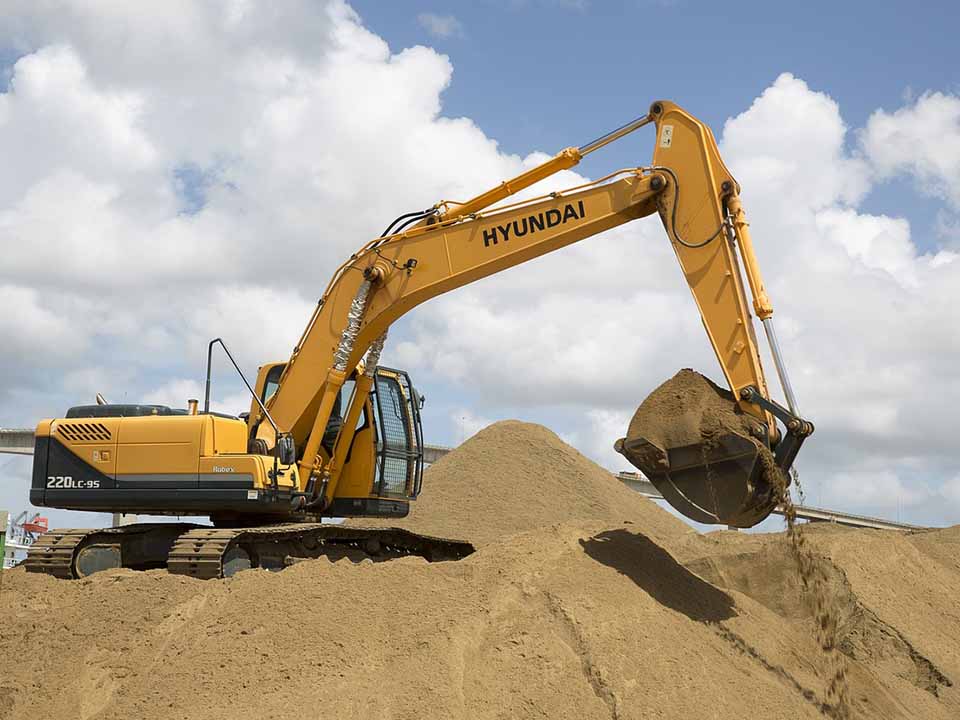Specializing in civil construction training, Sheer Workplace Training serves Brisbane from Hemmant and Paget, emphasizing excavator operations. Dive into the heart of construction with us; where mastering the excavator becomes your ticket to transforming landscapes and shaping futures. Our training goes beyond the basics, offering insights that turn complexity into your competitive edge, making sure you’re not just ready for the job market but poised to lead it.
What is an Excavator?
An excavator is a heavy construction machine used for digging, lifting, and moving materials. It consists of a boom, dipper (or stick), bucket, and cab on a rotating platform known as the “house.” This machinery is essential in various tasks such as excavation, demolition, mining, and lifting heavy objects.
Types of Excavators
The construction industry uses several types of excavators, each suited for specific tasks. These include:
- Crawler Excavators: Used in mining and heavy-duty construction jobs.
- Wheeled Excavators: Ideal for urban-based or soft terrain projects.
- Mini Excavators: Perfect for small-scale projects or tight spaces.
- Long-Reach Excavators: These have an extended arm, useful for demolition projects and reaching far or deep spaces.
- Hydraulic Excavators: Equipped with advanced hydraulic systems, they are ideal for heavier tasks in construction and mining.
- Dragline Excavators: Used mainly in large-scale civil engineering and surface mining projects for deep excavations.
- Suction Excavators: Also known as vacuum excavators, they use high-powered suction to remove materials like soil, sand, etc.
- Amphibious Excavators: Designed to work in aquatic environments, suitable for dredging and water-based construction.
Excavator Operations in Civil Construction
In civil construction, excavators play a pivotal role.
- Earthmoving: Essential in grading, landscaping, and site preparation.
- Trenching: Important for laying pipes and foundation work.
- Demolition: Used for dismantling structures efficiently.
- Material Handling: Manage materials like rubble, soil, and debris.
- Dredging: Employed in waterways for sediment removal.
- Snow Removal: Effective in colder regions for clearing snow.
- Mining: Integral in surface and underground mining operations.
Excavator Applications
Excavators are versatile machines, finding applications in:
-
- Residential and Commercial Building: For foundational work, landscaping, and site clearing.
- Road Construction: In cutting embankments, digging trenches, and laying road foundations.
- Utility Work: Essential for laying pipes, cables, and general maintenance.
- Forestry: Used for land clearing, logging, and forest management.
- Mining Operations: Integral in material removal and site preparation.
- Agriculture: Assists in land clearing, irrigation projects, and farm maintenance.
- Municipal Work: Employed in city development, including park development and maintenance.
Safety Considerations When Operating an Excavator
Safety is paramount when operating an excavator. Operators are deemed competent only after rigorous training. Key safety aspects include:
- Training and Competence: Operators must be deemed competent through accredited training programs that cover both theoretical and practical aspects of excavator operation.
- Inspection Before Use: A thorough inspection of the excavator is required before operation, focusing on potential hazards like leaks, damaged parts, and operational integrity.
- Worksite Assessment: Assessing the worksite for risks such as underground utilities, overhead lines, and terrain stability is crucial for safe operation.
- Using Personal Protective Equipment (PPE): Operators must wear appropriate PPE including helmets, safety glasses, ear protection, and high-visibility clothing.
- Adherence to Operational Protocols: Strict adherence to operational protocols, including hand signals, load limits, and digging techniques, is essential.
- Emergency Procedures: Familiarity with emergency procedures, including shut-down processes and evacuation routes, is vital for operator safety.
- Traffic Control and Signage: Implementing effective traffic control measures and clear signage to ensure the safety of both the operator and bystanders.
- Regular Training Refreshers: Ongoing training refreshers to keep operators updated on the latest safety practices and machinery updates.
- Awareness of Surroundings: Operators must constantly be aware of their surroundings, especially when maneuvering in tight spaces or near other workers.
- Communication: Clear and constant communication with ground staff and other equipment operators to maintain a safe working environment.
Maintenance and Repair of Excavators
Regular maintenance and timely repair of excavators are crucial to ensure their longevity and efficiency. This includes:
- Regularly Scheduled Maintenance: Adhering to a strict maintenance schedule, including checking engine performance, hydraulic systems, and structural components.
- Hydraulic System Care: Regular checks and maintenance of the hydraulic system to prevent leaks and ensure smooth operation.
- Track and Undercarriage Inspection: Frequent inspection and maintenance of tracks and undercarriage to prevent malfunctions and ensure longevity.

- Lubrication: Ensuring that all moving parts are adequately lubricated to reduce wear and tear.
- Checking Control Mechanisms: Regularly checking control mechanisms for responsiveness and ease of operation.
- Bucket and Attachment Care: Inspecting and maintaining the bucket and other attachments for signs of wear or damage.
- Engine Maintenance: Regular engine checks, including oil and filter changes, to ensure optimal performance.
- Electrical System Checks: Routine inspections of the electrical system to prevent malfunctions that could lead to safety hazards.
- Record Keeping: Maintaining detailed records of all maintenance and repairs performed on the excavator.
- Professional Inspections: Regular inspections by qualified professionals to identify issues that may not be apparent to operators.
Environmental Considerations
The environmental impact of excavator operations cannot be overlooked. Efficient use, adherence to emission standards, and noise reduction strategies are vital.
- Emission Controls: Ensuring that excavators comply with emission standards to reduce environmental impact.
- Noise Reduction Strategies: Implementing noise reduction measures to minimize the impact on surrounding areas.
- Efficient Fuel Use: Promoting efficient fuel use to reduce emissions and conserve resources.
- Waste Management: Proper disposal and management of waste materials like oil, filters, and damaged parts.
- Water Conservation: Using water responsibly during cleaning and maintenance to minimize waste.
- Eco-friendly Lubricants: Using biodegradable lubricants where possible to reduce environmental harm.
- Sustainable Practices: Adopting sustainable practices in operations, such as recycling parts and using renewable energy sources where feasible.
- Habitat Protection: Ensuring that operations do not harm local wildlife or their habitats.
- Soil Protection: Implementing measures to prevent soil contamination and erosion during excavator operations.
- Green Technologies: Exploring the use of green technologies such as electric or hybrid excavators to reduce the carbon footprint.
Excavator Technology
Recent advancements in technology have led to more efficient and safer excavators. Features like:
- Advanced Control Systems: Implementation of sophisticated control systems for enhanced precision and ease of operation.
- GPS and Telematics: Utilizing GPS for navigation and telematics systems for real-time monitoring of excavator performance and diagnostics.
- Hybrid Power Systems: Incorporation of hybrid power systems to improve fuel efficiency and reduce emissions.
- Automated Safety Features: Integration of automated safety features like collision avoidance systems and automatic shut-off.
- Remote Operation Capabilities: Development of remote control technologies, allowing operators to control excavators from a safe distance.
- Electrification of Excavators: Transition towards electric excavators to minimize environmental impact and improve efficiency.
- Enhanced Attachment Versatility: Designing excavators with quick-coupling systems for easy attachment changes to increase versatility.
- Data Analytics for Maintenance: Employing data analytics to predict maintenance needs and optimize equipment uptime.
- Operator Comfort and Ergonomics: Focusing on operator comfort and ergonomics to improve productivity and reduce fatigue.
- Augmented Reality (AR) for Training: Using AR technology for immersive training experiences, enhancing skills without the need for physical machinery.
The Future of Excavator Operations
The future of excavator operations is leaning towards automation, increased safety measures, and environmentally friendly practices.
 Autonomous Excavators: Advancements towards fully autonomous excavators for increased efficiency and safety.
Autonomous Excavators: Advancements towards fully autonomous excavators for increased efficiency and safety.- Integration with Building Information Modeling (BIM): Linking excavator operations with BIM to enhance precision in construction projects.
- AI-Powered Decision Making: Incorporating artificial intelligence for smart decision-making and operational efficiency.
- Advanced Environmental Protection: Innovating further to reduce the environmental footprint of excavator operations through cleaner technologies.
- Customizable Excavator Software: Development of customizable software solutions for excavators to meet specific project needs.
- 3D Printing in Excavator Manufacturing: Utilizing 3D printing for producing customized excavator parts, leading to quicker repairs and modifications.
- Expansion in Modular Design: Moving towards a more modular design in excavators, enabling easy upgrades and modifications.
- Internet of Things (IoT) Integration: Embedding IoT devices in excavators for enhanced connectivity and data sharing.
- Robotics in Excavator Operations: Incorporating robotic technology to handle complex tasks and enhance operational efficiency.
- Increased Focus on Operator Training and Certification: Emphasizing the importance of specialized training and certification to operate advanced excavator technology effectively.
Course Overview
At Sheer Workplace Training, our course, RIIMPO320F Conduct Civil Construction Excavator Operations, is a nationally recognised unit of competency. It covers all aspects required to operate an excavator safely and efficiently in the industry sectors.
Skills and Knowledge Required
Our training organisation ensures that participants gain the skills and knowledge required to:
- Plan and prepare for excavator operations
- Operate the excavator, including lift, carry, and place materials
- Conduct operational maintenance
- Comply with traffic control protocols
Upon successful completion, participants receive a statement of attainment, affirming their proficiency.
Excavator operations are a vital component of the civil construction industry. At Sheer Workplace Training, we ensure that our trainees are not just operators, but industry-ready professionals equipped with the right skills, knowledge, and safety awareness. For more information or to enroll in our course, please visit our website or contact us at our Brisbane locations.



Leave a Reply